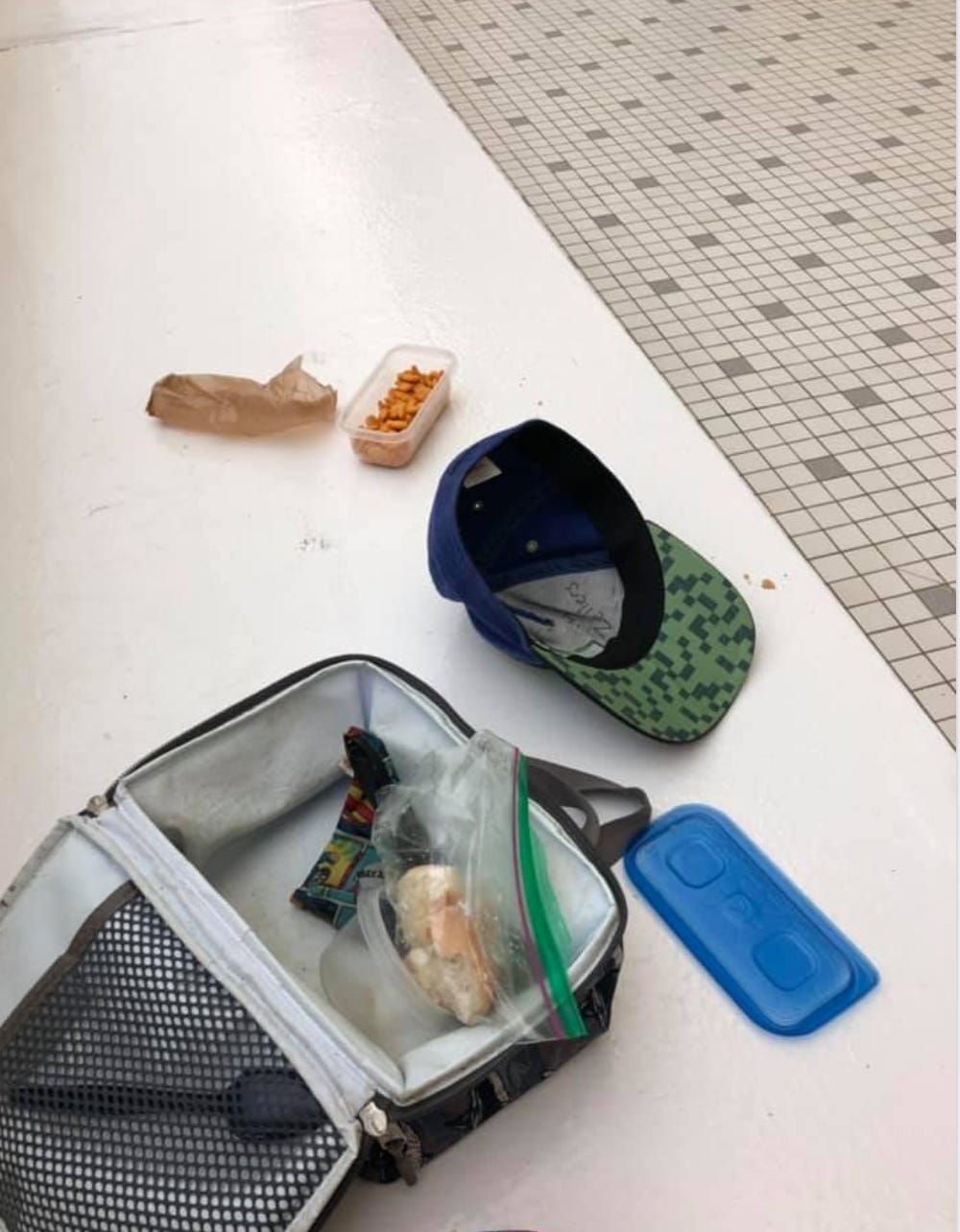When bad tantrums happen to pretty good moms
You're not a parent until you've abandoned a full shopping cart in a store and felt fine about it
Before I had kids, there was some part of me that low key thought only bad children of bad parents had public tantrums. Which is why I took it so personally when my kids had eventually tantrums. Either I was a bad mom with bad kids, or I brought this upon myself for being so judgemental.
But the truth is, just about all kids have tantrums, even many older ones, so let’s talk about what witches have done to address how they respond (or not respond) to them. Below are some tried and true methods witches have used towards tantrums in the past, none of which are designed to make you feel bad for not being an intuitive mama who would never commit the violent act of withholding love via time outs, or whatever.
Note that if tantrums are wearing you down, become a paid subscriber, if you haven’t yet, to get tomorrow’s issue, which is a chat on the moments when you feel like you are a good mom.
Q: “Any advice for trying to get a 6 year old to have fewer tantrums over… everything? Both my kids still have tantrums (my older one far less often, thank god) and either I'm very bad at guiding their calm, measured expressions of feelings or I've been misled into believing that tantrums are supposed to stop after the toddler years. I wish I had a better toolkit.”
Witches responded! [ETA — The suggestions in the newsletter below don’t specifically address issues related to tantrums in neurodivergent kids, but please read on to the comments if this relates to your and your kid, and weigh in if you have expertise to share.]
“Our protocol (for an almost-8 year old who has been in therapy for tantrums, among other things, since she was 4): When she tantrums, she has to go to her room for a cool down. If she won't stay in her room or fights particularly hard, she has to stay in her room until she can write about or draw about her feelings. She hates talking about her feelings so much, she initially stopped tantrum-ing altogether! It wasn't a total silver bullet, but she has learned that the way to avoid that consequence is to take herself up to her room or outside for a bit to yell it out, and come back when she's calmer. I'm not saying it's not still aggravating AF to have a kid scream in my face a few times a week, but it's pretty amazing to see her finally figuring out for herself what helps. (The best part: She has just recently started sitting down and rage drawing. Without being told or having it held out as a consequence. The great thing about the journaling is you can use that even in the morning - ‘If you keep yelling for XYZ time, when we get home today, you'll need to write about it.’ And, like, it’s NOT a shitty consequence because it's teaching them an actually useful life skill (write about your feelings!) but if they hate it and then get it together, it helps you suss out how much these tantrums are within their control/a habit that needs changing.”
“My 4 year old has always been a screamer, since the beginning. And if we lose it and yell at him then he REALLY freaks out. When he’s tantruming I tell him it makes everyone really upset when he screams. And he’s allowed to be upset but he’s not allowed to scream and scream for attention. If he continues, he gets a time out. When he’s really freaking out he hates time outs but when he’s just starting to freak, he will sometimes just take himself upstairs and say, ‘I’m getting a timeout aren’t I?’”
“A friend took video of her kid's tantrum without her knowing; then later, in a calmer moment, she showed her the video. It apparently worked like a miracle.”
“Last year my kindergartener started having these terrible tantrums right before school started. When he’d start to pitch a fit I’d walk him over to a big park near us. He would hit and spit and pull plants along the way. But when we got the middle park he calmed down. The idea, basically, was that he couldn't fuck up the family/house atmosphere with his tantrum. Being outside took away a lot of his oxygen.”
“We just started therapy for our four-year-old a month ago. Here's what we’ve been instructed to do as a first step: Ignore if the behavior is obnoxious but not destructive. Just totally stonewall it, even in your face. It is HARD because it is counterintuitive. If the behavior is destructive (kicking, biting, throwing, etc.) that is an automatic time out. If it’s somewhere in between -- like arm swinging or foot stomping that you can tell could turn violent, then you can do the 1, 2, 3 Magic counting toward a time out. The therapist also had us buy a special pillow or stuffed animal that our son could take his aggression out on instead of, say, chucking his books across the room. We let him pick it out, and he picked ‘Anger’ from Inside Out!
“This is not fun advice but for me being sober has helped the way I respond to the tantrums. I think I just am slower to get angry/upset right back if I’m not hungover or tipsy and that helps. I have been shouting a lot less since I quit drinking (unlike some husbands I know.)”
“Being the cheerful enforcer on limits, consequences, etc - staying calm and positive and giving the message/limit clearly but not constantly repeating it, helps. ‘Oh man, it's already 7:50 - if we don't leave with all our stuff in the next five minutes, there won't be time to stop for a croissant!’ and giving positive reinforcement for ANY effort or movement in the right direction. Detecting triggers is also huge - I can now say to my 10 year old, "Hey, that was loud, I'm wondering if you’re..." and he'll say ‘Yeah, I need to eat before anything else’ - because hanger is a big thing for him. Or, he gets easily overwhelmed when his dad and I are both breezing through and giving multiple instructions without even looking at him, all while he's eating breakfast or whatever. So a whiteboard with a checklist it is! No one is ‘yelling a bunch of stuff all at once’ anymore.”
“My middle kid was a difficult baby and a very tantrum-y kid. So many screaming tantrums. Nothing worked. I used to put her in her room so that I wouldn’t kill her (her screaming pushed all my buttons) and she would scream ‘I’m hungry!’ Or ‘I want a hug!’ Over and over, so loud that the neighbors could hear her down the block. Guess what? She did not actually want a hug and she wasn’t hungry. When she got older, maybe age 9-14, the tantrums stopped, but she could wind herself up into almost a tantrum when she started listing complaints and grievances. Now that she is 16 and can articulate her feelings, and is in therapy, it’s clear that she has no tolerance for discomfort. She doesn’t have that sensitivity thing, but would complain about the fit of socks endlessly, and have tantrums about them. She also has tons of anxiety that doesn’t look like anxiety: it looks like irritability. You can try to notice what sets her off and see if you can nip things in the bud. Like, I would dress my kid when she was half asleep so that I didn’t have to fight her for 45 minutes about getting dressed. My kid is totally fabulous now, but she was so difficult for so many years. Note that my oldest never had tantrums, and the youngest doesn’t have many, so it’s not parenting, it’s the kid’s personality. Good luck!”
“I read a couple different parenting books looking for answers to this question with our 4 year old, and I really feel like the vast majority of them are about managing one's own triggers versus changing the kids' behavior. But that’s still been helpful for us. Here are my Cliff’s Notes:
1) 123 Magic: the nugget ‘no words, no emotions’ has been helpful for me in moments where you need to be intervening/ disciplining -- e.g. don't yell, don't raise your voice, just do what you need to do (physically remove kid from an escalating situation, take the stick away, whatever). Don’t try to argue with the kid. They literally can’t hear you and can'‘ control themselves in that moment, and your own tantrum will only make theirs worse.
2) Parenting Without Power Struggles: your kid needs you to be calm and authoritative, so you should do what you need to do to maintain that state -- including understanding your own triggers and working on strategies to loosen them. I liked the counsel to create a plan and stick to it to the extent humanly possible (eg, “This is our limit to TV time,” “This is what time we leave the house,” etc), and that part of preventing future blow-ups is sticking consistently to the limits you've preadvertised. A lot of this book's recommendations echo Montessori principles, like wiring your physical environment to reduce conflict points, the importance of routines, ways to increase their sense of self-control and competence.
3) Raising Human Beings: suggests thinking through problems collaboratively, OUTSIDE of the conflict period (‘We seem to always have trouble getting out the door on time’/ ‘You’re consistently getting super upset with your sister,’ etc. ‘What can we do to address that together so it doesn’t happen? Can we think of some solutions together?’). Ideally, you're talking it through in a relaxed, structured environment like a periodic family meeting.
4) I don’t remember the title but another book talks about natural versus logical consequences. Natural consequences are what happens without you taking any action after kids' misbehavior (the toy breaks because they were being careless despite your warning); logical consequences is you invoking some disciplinary step (you take away TV privileges). Natural consequences are generally a better path for their behavior change -- so if you're using logical consequences, pre-advertise what they'll be and make them as close to natural consequences as possible.”
“My bestie’s parents would calmly observe and critique her tantrums when she was a kid. ‘The screaming is good, but I’m not impressed by the kicking.’ ‘Agreed. This is not her best work.’”










End credits
I hope you enjoyed this issue of Evil Witches, a newsletter for people who happen to be mothers who crave expert advice, nonexpert advice, laughs, salty takes, the occasional deep thoughts, and interviews for and about witchy moms. If you like this newsletter and haven’t yet, please consider supporting this independent, nonsponsored work and joining the subscription level, which gives you access to fun, honest and helpful discussion threads plus bonus content like tomorrow’s reassuring look at what makes us feel like good parents.
If you have already subscribed, thank you. If you have any questions, feedback, or suggestions for the newsletter you can reply right to this email. You can follow us on Instagram here and talk to other witches on Twitter, too. And I always appreciate a shout on social media!









Don't forget possible developmental issues. Age 16-months to about age 4 are known as my youngest's "terrorist years". We could not go a day without at least 3 meltdowns. Despite all the assurances about "terrible twos" and recommendations, I knew something wasn't right.
At age 4 she was diagnosed with receptive and expressive language disorder and at 9 she FINALLY received a double diagnosis of ADHD/Autism (many girls are misdiagnosed because the evaluation criteria id skewed toward boys, but that's another rant.) Luckily, the supports she was receiving through school and her therapist was exactly what was needed for her new diagnosis.
We are lucky. Had this been another time or if I had not worked in the education/mental health field, she probably would have been labeled as a "bad" kid. It's hard for some parents to acknowledge the possibility that their kid is not neurotypical. However, if things are not getting better, I always encourage parents to get a thorough neuropsych evaluation. The earlier in interventions, the better the outcome for your kid.
Just popped in in response to so many endorsements for 1,2,3 Magic. I was in a booth next to the author of this book at a childhood psych conference and for 3 straight days practitioners and clinicians and therapists lined up at his booth to praise him and tell him how life-changing this book has been for their patients and families. He was a lovely man to boot and let me prattle on about my own pre-tween challenges with my son.